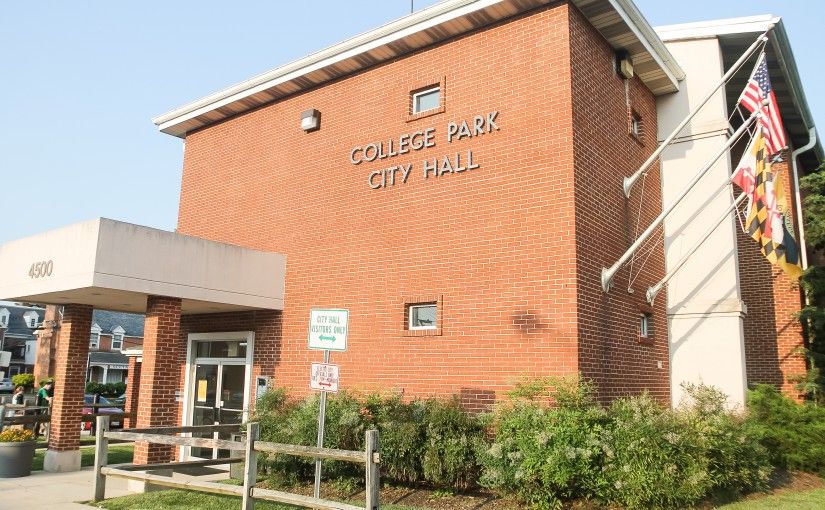It’s been a busy summer for the College Park City Council. Here’s what you missed.
Expanding access to the ballot box
Registering to vote is now much easier for College Park residents who are homeless after a July vote by the City Council.
Residents previously needed to provide a residential and mailing address when registering to vote. But after a unanimous vote from the City Council, they can now cite a city council building as their residential address, and the University of Maryland’s School of Public Policy as their mailing address.
“To me this is really important, and I’m really excited about bringing this forward,” said Kate Kennedy, who represents District 1. “Voting is an absolute right that we need to ensure we don’t put up any barriers to anyone, especially the most vulnerable of those around us, like those experiencing homelessness.”
The council started working on a resolution after Giovanni Marchand, a junior accounting and public policy major at this university, reached out to the city last spring. Leading up to the November municipal elections, Marchand and a group of other students were setting up a voter registration drive for the homeless, and wanted to see if they could use city addresses for the participants’ recorded places of residence.
After voter registration cards are mailed to the School of Public Policy, Marchand said he and his classmates will collect and distribute them to their respective owners at the next event for their nonprofit, which works to alleviate hunger and homelessness in the area.
“In our leadership, we can’t simply make decisions for the common good without listening to people,” Marchand said. “And so many voices are going unheard.”
Mayor Wojahn saw Mayor Pete
College Park Mayor Patrick Wojahn caught up with Democratic presidential candidate Pete Buttigieg at a July fundraising event for Buttigieg’s campaign in Riverdale Park.
Wojahn first met Buttigieg — mayor of South Bend, Indiana — as a newly-elected mayor at the 2016 United States Conference of Mayors. Buttigieg was assigned to show Wojahn around.
“I learned a lot about him, about being a mayor,” Wojahn said. “He’s done a lot of great things in the city of South Bend. He has experience getting things done.”
Wojahn said he especially admires the partnership Buttigieg built between his city and the University of Notre Dame, located just outside South Bend. As mayor, Buttigieg oversaw a collaboration between the city and Notre Dame researchers to build a sewer infrastructure system in South Bend regulated by sensor technology. Wojahn said he hopes to use this relationship as a model for taking advantage of university resources to construct smart infrastructure in College Park.
“I think he would make a great president,” Wojahn said. “Mayor Buttigieg is someone who’s had the experience of working with limited resources. Someone as a president who’s had that — I think it would be inspiring. It’d be the first time someone that’s younger than me would be president.”
Buttigieg’s campaign team did not respond to request for comment.
[Read more: City Council delays new College Park community garden after projected $20,000 increase]
City council moves forward with a ballot question on term lengths
Despite vocal public opinion against expanding terms on the city council from two to four years, the council decided to move forward with adding a non-binding question about the matter to ballots for the municipal elections this November.
Last fall, the council voted to create a 10-member Charter Review Commission to research and present a report to the council on the pros and cons of extending term limits. The report, which the commission released in May, indicated that of the 94 public comments it received, only 10 supported the change.
Supporters of expanding term lengths say reduced turnover and less frequent elections could make for a more consistent and effective governance. Opponents argued accountability would suffer.
The commission solicited public comments online, and at two public forums. But this feedback may not represent the entire population’s feelings on the matter, said District 2 council member P.J. Brennan.
“The opportunity of bringing this to referendum is an opportunity to educate and begin a dialogue with our residents,” Brennan said. “In order to get the fullest picture, I kind of lean back towards going to the populace that engages in the election process to get a clear stand on that.”
[Read more: UMD SGA president, city council liaison endorse College Park Mayor Wojahn for reelection]
Council vote to spend $19 million on City Hall, Duvall Field
College Park City Council voted 6-2 at their Aug. 13 meeting to move forward in securing up to $19 million in bonds to finance the construction of the new City Hall and Duvall Field projects.
The ordinance passed despite opposition from residents, who asked at the public hearing for the council to instead put the decision to a non-binding referendum on the November ballot.
The North College Park Community Association penned a letter to the mayor and council expressing concern, which president Mary Cook read aloud at the hearing.
“Although the referendum would be non-binding, NCPCA contends it is essential for the mayor and council to recognize the taxpayer’s will,” read Cook, who is also a former council member. “We hope that you, our municipal leaders, will seriously consider this request as part as your performance as elected officials.”
District 1 councilman Fazlul Kabir made a motion to move the decision to referendum, which didn’t receive the two-thirds majority needed to pass. He and District 4 council member Denise Mitchell both voted against the ordinance.
Of the approved $19 million, $14 million would be allocated to the new City Hall and $5 million to the Duvall Field renovations. In April, the new city hall — a project shared with the University of Maryland — was already projected to cost $8 million more than estimated, at almost $50 million.



